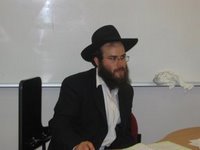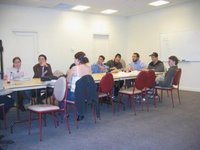

JEWISH NEWS
(AUGUST 16, 2007)
Music legend Bob Dylan. RIGHT: Rabbi Yankel Rapp ... surprise meeting. Photo: Peter Haskin
DARREN LEVIN
BEFORE Bob Dylan’s tour of Australia in 1992, the reclusive music legend, well-known for his indifference towards the media, granted two interviews: one to The Age journalist Peter Wilmoth, another to Sydney radio presenter Stuart Coupe.
Earlier that year, he had turned down 300 more.
For years, Dylan had built up an otherwise impenetrable wall with the world. And if – for whatever reason – he’d finally grant an interview, the man would talk in riddles. Dylan’s pragmatic excuse? He was boring.
“There’s nothing that is really very interesting about me,” the singer behind Blowin’ in the Wind and Like A Rolling Stone told Wilmoth backstage at Melbourne’s Palais Theatre. “It doesn’t interest me to talk about me. It’s my least favourite subject,” he joked.
This, wrote Wilmoth, was Dylan in a “good mood” he didn’t walk out on him after seven minutes (like he had done to reporters in the past) and he acknowledged him with a grunt and a limp handshake.
It was a very different Bob Dylan that greeted Melbourne’s Rabbi Yankel Rapp two days later. “He was a sorry sight at the time,” recalls Rabbi Rapp, who now runs university outreach group Merkos on Campus in Melbourne.
“He was a lost soul, a sad guy. With all his profoundness, with all his depth, a pinteleh Yid was there.”
Rapp encountered Dylan twice during his 1992 tour – the first time at a shul service at Chabad House of Caulfield and later in his hotel room on the top floor of the St Moritz hotel (now, The Novotel St Kilda).
But how did Rapp get the kind of access even the most savvy reporters could only dream of? With chutzpah, of course.
“A friend of mine, who was doing a lot of interviews with rock’n’roll stars and personalities, mentioned that Dylan was the one guy he always wanted to interview, but he couldn’t get to him,” says Rapp.
“This guy had tried for years, but he was an iron-clad recluse. I thought, ‘OK, I’m going to have a bash,’ so I rang up the ticket office and said, ‘I have to speak with Mr Dylan.
’”When representatives from the ticket company laughed off his requests, Rapp asked to speak to their supervisors. He eventually worked his way up the food chain until he received a phone call from a Victor Maynudes, who inquired about a Friday night service.
Unbeknown to the young Chabad rabbi, Maynudes was Dylan’s personal manager and close friend.
“Suddenly it clicked,” recalls Rapp, “I asked him whether he was involved with Mr Dylan and he said, ‘Yeah, but don’t make a big deal about it.’”
Rapp invited the pair to a Friday night service at Chabad House of Caulfield, not expecting them to show.
“The service was over already and they hadn’t shown up. I went outside to have another look and then, all of a sudden, I see these two guys walking up,” he recalls.
“He [Dylan] was wearing jeans, a denim shirt and thongs, and he walked up to me with his hands in his pockets. He was unshaven, unkempt. I went back inside and said, ‘Listen, we’re going to have to put on a service again.’”
Rapp recalls Dylan as being “genuinely concerned about Yiddishkeit”. While born Robert Zimmerman, a Jew, Dylan flirted with Christianity for most of the 1980s.
“He had a strong feeling about it,” Rapp says. “Obviously if you go out looking for a place to davven on Friday night, there’s a Yiddishe neshama [soul] there.”
After the service, Rapp and a colleague accepted an invitation from Dylan to visit him at his St Kilda hotel.
“He obviously liked the service,” jokes Rapp. “We spent a good hour with him in his room. It was a very bizarre scene. He had the top floor of the hotel booked out ... He had his roadies who were basically just interested in girls and drugs. But he had his own room, which was completely separate.
“He had every single window open,” Rapp recalls. “There was this crosswind going across the room – it was like a desert. I can’t describe it. The wind was whistling and blowing through the place.”
After laying tefillin with the star – according to the rabbi it was his “first pair” – Rapp chatted with Dylan for an hour, discussing everything from his born-again Christian period to his Jewish upbringing in suburban Minnesota. Throughout the conversation, Rapp referred to him by his Yiddish name, Zusha.
And for once, the enigmatic singer let his guard down.“At one stage, he was in tears talking to me,” remembers Rapp. “It was a very emotional and moving experience for him at the time.”
As for Dylan’s windswept hotel room, Rapp has his own theory.
“I gave him the answers,” he says, “and they were blowing in the wind.”



No comments:
Post a Comment